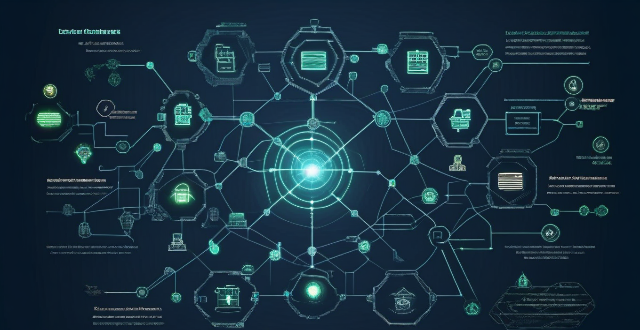This article explores the potential applications of blockchain technology beyond cryptocurrency, highlighting key areas such as decentralized finance (DeFi), supply chain management, healthcare, government services, and intellectual property rights management. It emphasizes how blockchain can improve transparency, security, efficiency, and accessibility in these sectors through features like peer-to-peer transactions, smart contracts, tokenization, traceability, interoperability, data privacy, identity management, public records storage, voting systems, proof of ownership, streamlined licensing, and fraud prevention. The article concludes by stating that the future prospects of blockchain technology are vast and promising, offering numerous opportunities for innovation and transformation across various industries.

The Future of Blockchain Beyond Cryptocurrency
Blockchain technology has been widely recognized as a groundbreaking innovation that has the potential to revolutionize various industries beyond the realm of cryptocurrency. While blockchain initially gained popularity as the underlying technology for Bitcoin and other cryptocurrencies, its applications extend far beyond digital assets. In this article, we will explore the future prospects of blockchain technology in different sectors and how it can transform traditional business models.
Decentralized Finance (DeFi)
One of the most promising areas for blockchain technology is decentralized finance, or DeFi. DeFi aims to create a financial system that is more accessible, transparent, and secure than traditional finance by leveraging blockchain's decentralized nature. Some key features of DeFi include:
- Peer-to-peer transactions: Transactions are conducted directly between parties without intermediaries like banks or brokerage firms.
- Smart contracts: Automated contract execution ensures that agreements are fulfilled without the need for trust or intermediaries.
- Tokenization: Real-world assets such as real estate, art, and even intellectual property can be tokenized and traded on blockchain networks.
Supply Chain Management
Blockchain technology can significantly improve supply chain management by providing end-to-end traceability, increased transparency, and reduced fraud. Key benefits include:
- Traceability: Every product can be tracked from raw materials to finished goods, allowing consumers to verify the authenticity and origin of products.
- Efficiency: Smart contracts can automate processes like payment settlements and inventory management, reducing administrative costs and errors.
- Security: Immutable ledgers ensure that data cannot be manipulated or deleted, protecting against counterfeit products and fraudulent activities.
Healthcare
The healthcare industry can benefit from blockchain technology by improving patient data management, ensuring data privacy, and enabling seamless sharing of medical records across providers. Key applications include:
- Interoperability: Blockchain can facilitate the secure sharing of patient data among different healthcare providers, reducing fragmentation and improving care coordination.
- Data privacy: Patients can maintain control over their medical data while granting selective access to authorized parties through smart contracts.
- Clinical trials: Blockchain can streamline clinical trial processes by ensuring data integrity, improving participant tracking, and reducing administrative burdens.
Government Services
Governments worldwide are exploring the use of blockchain technology to enhance public services and increase efficiency. Key areas of application include:
- Identity management: Blockchain can provide a secure and decentralized platform for managing digital identities, reducing fraud and improving service delivery.
- Public records: Land registries, birth certificates, and other public records can be stored on blockchain networks, ensuring transparency and accessibility.
- Voting systems: Blockchain-based voting systems can increase voter turnout, reduce election fraud, and improve the overall security of democratic processes.
Intellectual Property Rights Management
Blockchain technology offers a solution for managing intellectual property rights effectively by providing an immutable record of creations and ownership. Key benefits include:
- Proof of ownership: Artists, writers, and inventors can securely store evidence of their creations on blockchain networks, ensuring proper attribution and protection against copyright infringement.
- Streamlined licensing: Smart contracts can automate the licensing process for intellectual property, reducing transaction costs and increasing efficiency.
- Fraud prevention: Blockchain's transparency and traceability features help prevent counterfeit goods and piracy by enabling verification of authenticity.
In conclusion, the future of blockchain technology extends far beyond cryptocurrency, offering numerous opportunities for innovation and transformation across various industries. As adoption continues to grow, we can expect to see significant advancements in decentralized finance, supply chain management, healthcare, government services, and intellectual property rights management. By leveraging blockchain's unique properties such as decentralization, transparency, and immutability, businesses and organizations can create more efficient, secure, and equitable systems that benefit society as a whole.